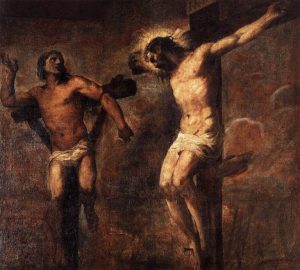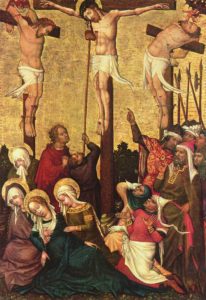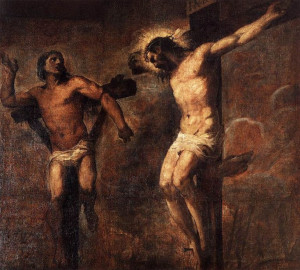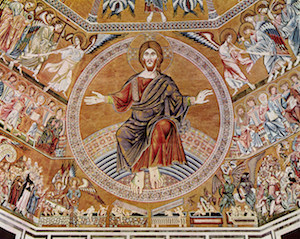Illuminations on the Lectionary readings for Nov. 20, 2022 (Christ the King C)
First Reading (Both Lectionary Tracks): Jeremiah 23:1-6
On this, the last Sunday after Pentecost, we mark the feast of Christ the King, a concept borrowed from modern Roman Catholic practice in the spirit of ecumenism that followed Vatican II in the 1970s.

Christ and the Good Thief (c.1566), oil painting on canvas by Tiziano Vecellio, known as Titian (c.1490-1576). Pinacoteca Nazionale di Bologna, Italy. (Click image to enlarge.)
It takes note of Christ’s messianic kingship and sovereign rule over all creation. Both Lectionary tracks join in the first reading, in which the prophet Jeremiah speaks fierce truth to the leaders of Babylon who held the people in exile. God will soon round up the remnant of his scattered flock and bring them home like a shepherd, the prophet foretells, warning the oppressors that they will be punished for their evil. Soon God will raise up a a mighty new king in David’s tradition, restoring the glory of the lost kingdoms Israel and Judah.
Psalm (Track One): Luke 1:68-79 (Canticle 16)
This week in place of a psalm we sing Canticle 16, Luke’s Song of Zechariah. Zechariah – whose wife, Elizabeth, was the cousin of Jesus’ mother, Mary – was a priest at the Temple. When he refused to believe that his elderly wife had become pregnant after an angelic visitation, he lost the power of speech. Now his voice returns as he holds the infant and names him John. The child, he declares, will be a prophet in the tradition of Abraham and Sarah – who also were blessed with a child in their old age through God’s action. The child, Zechariah proclaims, will be the prophet who will go before Jesus, the Messiah and king, to declare his way.
Psalm (Track Two): Psalm 46
This Psalm of praise may not explicitly speak of kings, but it reassures us that whenever terrible things happen, even when Earthly kingdoms and nations are shaken by frightening events, when mountains rock and the oceans roar and foam, God remains with us. God doesn’t promise us a world where horrors can’t happen and no one ever suffers. But even in the worst of times, God abides, inviting us to take refuge in God’s strength. Our Prayer for Quiet Confidence (BCP p.832), draws from Psalm 46 as it reminds us, “Be still, and know that I am God.”
Second Reading: Colossians 1:11-20
The Christian community of Colossae in what is now Western Turkey may have felt something like Jeremiah’s remnant of Israel in exile. They lived under the constant threat of Roman persecution, fearing that they might lose their homes and even their lives for their faith. The author of this letter urges them to endure their difficulties with patience and the strength that comes from God’s glorious power expressed through Jesus. Jesus, through his incarnation as God in human flesh and the first of all creation, rescues us from the power of darkness and transfers us into the kingdom of Christ.
Gospel: Luke 23:33-43
And now at the end of Pentecost season we reach the end of Jesus’s long road to Jerusalem as told by Luke. This Gospel reading mirrors the Good Friday Gospel, reminding us of our hope for Easter and the resurrection. Jesus is crucified in the company of criminals: a horrible death reserved for Rome’s most despised evildoers, . The inscription over Jesus’ head reads “This is the King of the Jews,” not as a literal statement but an act of public shaming by Pontius Pilate. Soldiers mock him and a crowd makes fun of him. This is surely no traditional king. Meanwhile, Jesus gently invites the repentant criminal at his side into a different kind of kingdom, one for all humanity and for all time.



